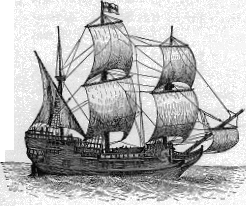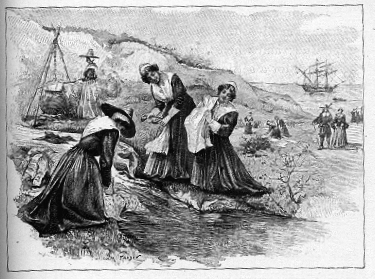|
Chapter 3 |

HOW THEY SIGNED AN AGREEMENT ON SHIPBOARD.
WHEN at last the Pilgrims really got under way for America, it was in one small, poorly built ship, which strained and cracked so badly in a fierce mid-ocean storm that it would surely have gone to the bottom if one of the passengers had not happened to have with him a big Dutch screw which he had brought from Holland, and with which he screwed together the pieces of the broken main beam. This rickety little ship was called the Mayflower. The Pilgrims had spent two good months in getting started. It was not their fault, however. They had met with nothing but disappointments and delays from the very day they left Leyden. They had sailed across to England in a good-for- nothing craft called the Speedwell, which did not speed at all well. When they reached Southampton they found that 22 |
|
23 their friends in England had arranged with one of the trading syndicates—the London Company—to assist the enterprise, and send over more colonists with them in another ship, the Mayflower. So the two little vessels sailed out of Southampton; 1but the good-for-nothing Speedwell sprang a leak, and they had to stop for repairs, only to break down again. At Plymouth, in southwestern England, the Speedwell finally had to be abandoned. Here, too, a number of the passengers, disgusted or frightened over the unlucky start, gave up going, and those who were determined to go on joined into one company, and all went aboard the Mayflower, which finally, on the i6th of September, 1620, sailed out of Plymouth harbor, bound across the sea. The real voyage had begun at last. It was a long, rough autumn voyage of nearly two months. The company on the Mayflower made up of those who did not back out and would not lose heart, amounted to one hundred and two persons,—men, women, and children. Although the Mayflower was very nearly wrecked in mid-ocean, at last, on the 9th of November, the wanderers sighted land. It was the long, low, flat, forest-fringed, sandy shores of the outer or ocean side of Cape Cod, well up toward the "fist." But no safe landing could be made on that shoal-lined, dangerous beach. The captain did not dare to risk a longer voyage to Virginia, so, after being almost ,cast away on Pollack Rip, they rounded Cape Cod,— so named years before by Captain Gosnold, because of the vast numbers of codfish he found there,— and on the 11th of November they came to anchor in |
|
24 what is now the harbor of Provincetown. And here, like the God-fearing folk they were, they fell upon their knees, so William Bradford tells us, and "blessed the God of heaven who had brought them over the vast and furious ocean, and delivered them from all its perils and miseries." I suppose you might call that 11th of November really the first Thanksgiving Day in Massachusetts. Long before the Mayflower reached Cape Cod, however, Bradford and Brewster and the other real Pilgrims discovered that a number of their fellow-passengers were not. Pilgrims at all, but were men put on board as a speculation by the English syndicate, which had hired them to go, or had given them free passage, with the idea of making something out of them or their labor when they at last got to work in America. But when it was decided not to go to Virginia, but to another part of the New World, these "servants" of the London Company declared that their contract was broken, and that when they landed they were free to do as they pleased. They even planned a mutiny. It was clearly the duty of the Pilgrims to protect themselves from these irresponsible associates; so Bradford and Brewster and the responsible leaders talked things over, and for their own safety determined to make an agreement to hold together and act together, whatever happened. They did this by drawing up a paper, or "compact," which they signed, and by signing promised to live up to. That compact on the Mayflower really established what is called a civil government. It was government
|
|
25 by the act of the people, and is said to have been the first paper or document of that sort ever made and signed by the people, uniting together for self-protection and self-government. It was the first step toward the later Declaration of Independence which made the United States of America; and it should be remembered that this compact was a Massachusetts production, drawn up and signed in Massachusetts waters, in that landlocked harbor of Province-town, on the 11th of November, 1620. And this was what was written and signed that day in the cabin of the Mayflower by forty-one of the one hundred and two Pilgrims—the best and wisest, the bravest, most reliable and most determined men of that little company, headed by Bradford and Brewster and Miles Standish and John Alden, and others of famous name and glorious memory: "In the name of God, Amen. "We, whose names are underwritten, the loyal subjects of our dread sovereign lord King James, by the grace of God, of Great Britain, France, and Ireland king, Defender of the Faith, etc., having undertaken, for the glory of God and advancement of the Christian faith, and honor of our king and country, a voyage to plant the first colony in the northern parts of Virginia, do by these presents, solemnly and mutually, in the presence of God and of one another, covenant and combine ourselves together into civil body politic, for our better ordering and preservation and furtherance of the ends aforesaid; and, by! virtue hereof, to enact, constitute, and frame such just and equal laws, ordinances, acts, consti |
|
26 tutions and offices, from time to time, as shall be thought most meet and convenient for the general good of the colony, unto which we promise all due submission and obedience. "In witness whereof we have hereunto subscribed our names, at Cape Cod, the 11th of November, in the reign of our sovereign lord King James, of England, France, and Ireland the eighteenth, and of Scotland the fifty—fourth, Anno Domini, 1620." After that paper had been thus signed, the men who thus "covenanted and combined" had an election, and voted to make one of their best men, John Carver, governor of the colony for the first year. And there you have, in Massachusetts, the first really American act in our history, —signing a constitution and electing a governor, both by act of the people. This was on Saturday. That very day a scouting party of sixteen armed men landed to get firewood and to explore. But on Sunday "they all rested,"—because it was the Sabbath day,—a good Massachusetts custom, again. The next day being Monday, they established still another unchangeable Massachusetts custom: the Mayflower women had their first wash day. This was the real landing of the Pilgrims! The women went on shore at Provincetown with the accumulated "wash" of their respective families, and had a grand "Monday wash." This, as one student of history declares, was a notable event, and quite as worthy to be celebrated as the storied landing of the Pilgrims on Plymouth Rock. For, he says, that first wash day at Provincetown, on |

the 13th of November, 1620, was really the beginning of English domestic life in America,—the introduction of family life into a new land and a new home. For this coming of the Pilgrims was no expedition of adventure, no search for unknown cities, "rich in barbaric pearls and gold," no restless hunt for vast riches. It was a real "home hunt "—the beginning of a colony. The majority of that company were women and children. If men alone had come in the Mayflower, they probably would have gone off somewhere else or turned homeward when they did not find the genial climate and delightful country that Captain John Smith had reported, but, instead, a sandy waste swept by chill winds from the north. Having women and children in their party to protect and care for, they could not turn back. They simply |
|
28 So Bradford and Miles Standish and others of the men—sixteen in all—spent two days exploring the " fist" of Cape Cod; and when they decided that it was not the best place for a settlement, or even for winter quarters, they left the Mayflower in Provincetown harbor, and, with a strong party of thirty-four men, pulled across the bay in an open boat, called a shallop. The captain of the Mayflower had charge of this expedition by water, which landed at last in the very harbor which Captain John Smith had visited and called Plymouth, the Indians had called it "Accomac," and this the prospectors decided was the best place for a settlement. A month the Mayflower lay in Provincetown harbor; then, acting on the report of this search expedition, the little vessel pulled up anchor, hoisted sail, and tacked across the bay to Plymouth. But while Bradford was away with the searching company, his young wife was drowned in Provincetown harbor. So it was a sorry home making for him. When the Mayflower dropped anchor in Plymouth harbor, a working party went ashore to put up a big house for the colonists to live in. It was called the "Common House," and was near the water. Then, as fast as they could be cared for, a boat load at a time (one family or more) was rowed ashore from the Mayflower and set up housekeeping in the Common House. This was the landing at Plymouth -not all at once, or on the same day, but as soon as each family could be accommodated Some of them perhaps landed on Plymouth Rock. It was about the only rock on the beach; in fact, it was |

29
about the only rock anywhere on that sandy stretch that Massachusetts people call the south shore. Scientific people say that the rock itself was a "pilgrim," brought down to the Plymouth beach by some glacier drift or iceberg in the far distant days called the ice age. It was not a very big rock, and it was probably covered with water at high tide, but still, a boat load now and then may have landed at Plymouth Rock. Mary Chilton is said to have been the first woman to step ashore, and John Alden, a young man of whom you have all heard, is said to have helped Mary Chilton to step out on the rock. It was like him to lend her a helping hand, for John Alden was a very courteous and gentlemanly young man, so we will hope the story is true. |